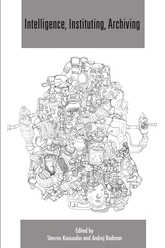Instituting the Intolerable: Shame, Ignorance and the Schema of Monohumanist Man
2025
In Deleuze and Guattari Studies, Vol. 19, Issue 4, 2025. Link

**Written initially as a lecture in July 2024 for the Deleuze and Guattari conference on Intelligence, Instituting, Archiving at TU Delft.
Deleuze and Guattari were in manifold philosophical company who grappled with the fascist Nazi atrocities of the mid-twentieth century. Quite distinctly however, they expanded concepts of fascism beyond a specific political-governmental configuration, its agents and their extreme acts of genocide, or a particular bracket of European history, speaking rather of fascistic tendencies across scales (molecular and molar, or micro and macro), and spectrums of manifestation (transcendent and immanent) – in effect, yoking libidinal economy with political economy (Seem 1983: xviii). For the purpose of elaborating the thematic terms of this Journal’s editorial framing, we may think of this in terms of the “intra-action” of autoinstituting and instituting, denoting the “mutual constitution of entangled agencies” that are inseparable as processes, rather than a figuring of atrocity as an external, finite historical episode with a determinate beginning and end (Barad 2007: 33). In navigating these various modalities of fascist tendencies that underwrite the concrete manifestation of atrocity, an expansion beyond the sheer adjudication of particular perpetrators is enabled, towards an examination of how indifference to, and tolerance of atrocity is conditioned – for which an overtly fascist form of government is not a precondition. To fork Wilhelm Reich’s infamous question as to how the masses come to desire their own repression (which served as a key referent in Anti-Oedipus), so too it must be asked, what makes it possible to tolerate atrocity in a world and/or to be indifferent to it? How is atrocity both autoinstituted and instituted?
Patricia Reed, "Instituting the Intolerable: Shame, Ignorance and the Schema of Monohumanist Man", in Deleuze and Guattari Studies, Volume 19, Issue 4, 2025. Link

